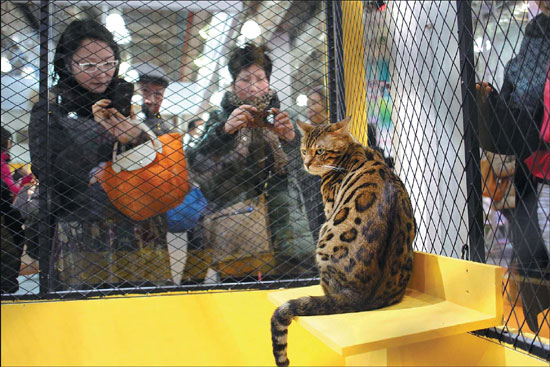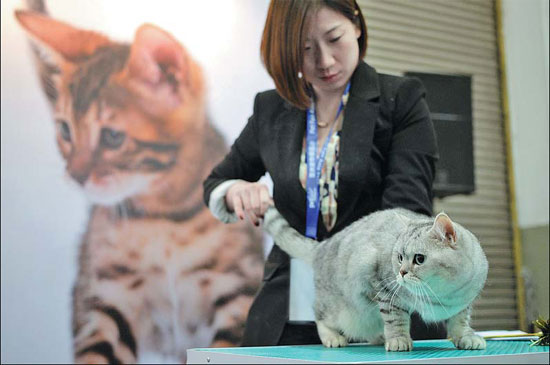Feline fine!
Updated: 2013-03-07 07:41
By Shi Yingying (China Daily)
|
||||||||
|
A Bengal cat attracts attention at the Shanghai Pet Fair. Photos by Gao Erqiang / China Daily |
Showing off cats is an increasingly popular pursuit. Shi Yingying in Shanghai finds that a significant industry has built up around competitions.
Li Xinke stepped up the grooming routine on his 4-month-old Oriental shorthair cat five weeks before the big show was to take place. He trimmed Baiguo'er's satiny, white fur, combed it with soft brushes and used a silk scarf to remove loose hair. "A single black hair sticking out can cost the cat a title," says Li, who had flown into Shanghai for Shanghai Pet Fair, which was held from March 1 to 3. He claims a household cat needs to be bathed every month, but Baiguo'er gets one bath a week in the run-up to the show, in addition to fur and ear-trimming sessions.
More than 90 cats, both household and pedigree, were judged on their coats, sizes, eye colors and breed characteristics.
"The quality of cats at the show surprised me," says the judge, Yang Wenqun, adding his comprehensive evaluation took into account the cats' facial features, teeth, frame, muscles and tail.
Tails, he says, can be particularly sensitive in some highly bred cats due to uneven bone distribution. "The cat may react or even attack you if you touch its tail," he says.
Yang says cats must be comfortable being handled in competitions if they are to be good show animals.
While cat shows are becoming more popular in China, the pet industry has also boomed in recent years. Grooming has become a sizeable business, transforming from offering simple fur trims to complicated styling.
Pet groomer Lin Jiyu travels across the country to style both ordinary pets and show specimens.
"Grooming has become a huge industry," says Lin, who comes from Guangzhou. "More people want to be groomers."
Lin, who specializes in dogs but didn't attend this year's show in Shanghai because she was looking after a puppy at home, says grooming is an essential part of the pet show circuit.
"Unlike dog shows, cat shows don't allow the owner to participate and the judges are complete strangers to the animals," Yang says. "They can only get used to the competition environment by becoming familiar with cages and show tables."
Yang adds that judges prefer cats that are "easy to handle".
Bai Yusheng, secretary general of Cat Aficionado Association, which organized the Shanghai cat show, says the rise of cats as pets makes perfect sense in crowded cities.
"Cats are perfect house pets. They're independent, easy to take care of and don't need a lot of space," he says, adding that southerners tend to like longhaired cats, while northerners prefer shorthair varieties.
"Some of the most popular breeds in recent years are the British shorthair, the exotic shorthair and Scottish fold."
According to Bai, the average pedigree cat costs about 20,000 ($3,200) to 30,000 yuan, plus breeding costs.
Carole Barbee, former president of the American Cat Fanciers Association and a judge at the Shanghai show, says different breeds are popular in different countries. "The Maine coon, for example, is now very popular in the States, while not many Chinese have them here," she says.
The manager of Shanghai's Naughty Family Pets, Leo Liao, says the company buys Bengal cats from about 20 breeders. The cross between the house cat and Asian leopard cat is, Liao says, the future of China's high-end pet market.
"After four generations of cross- and selective breeding, the cat has acquired a gentle temperament," Liao says, adding the cost for a good specimen is from 50,000 to 70,000 yuan.
There is a dark side to raising pedigree cats. It often means inbreeding and passing on serious inherited health defects, such as bad joints.
One example of inbreeding is the Scottish fold, which - as the name suggests - has folded ears. But the gene that produces these crinkled ears also causes deformed cartilage in the joints.
The pedigree breeding industry is mushrooming, with online prices for mating ranging from a few hundred to thousands of yuan.
Beijinger Wang Yue, who owns a few British shorthair champions, says she doesn't believe that cat shows necessarily drive a need for purebred animals.
"Cat shows are supposed to promote cat culture rather than destroy it," Wang says. "It's not just a beauty contest that doesn't care about the cat's health in an attempt to create a certain breed."
Cat shows typically have prize sections for all breeds, including ordinary household cats.
The 63-year-old Xia Guilian rescued 13-year-old Dang Dang from the streets in 2000 and says she's happy for her pet to share the stage with purebreds.
Contact the writer at shiyingying@chinadaily.com.cn.
Eric Jou and Zhu Lingqing contributed to the story.
|
A judge observes a British shorthair during a competition at the fair. |
(China Daily 03/07/2013 page18)

 In Photos: 7.0-magnitude quake hits Sichuan
In Photos: 7.0-magnitude quake hits Sichuan
 Li Na on Time cover, makes influential 100 list
Li Na on Time cover, makes influential 100 list
 FBI releases photos of 2 Boston bombings suspects
FBI releases photos of 2 Boston bombings suspects
 World's wackiest hairstyles
World's wackiest hairstyles
 Sandstorms strike Northwest China
Sandstorms strike Northwest China
 Never-seen photos of Madonna on display
Never-seen photos of Madonna on display
 H7N9 outbreak linked to waterfowl migration
H7N9 outbreak linked to waterfowl migration
 Dozens feared dead in Texas plant blast
Dozens feared dead in Texas plant blast
Most Viewed
Editor's Picks

|

|

|

|

|

|
Today's Top News
Live report: 7.0-magnitude quake hits Sichuan, heavy casualties feared
Boston suspect cornered on boat
Cross-talk artist helps to spread the word
'Green' awareness levels drop in Beijing
Palace Museum spruces up
First couple on Time's list of most influential
H7N9 flu transmission studied
Trading channels 'need to broaden'
US Weekly

|

|









